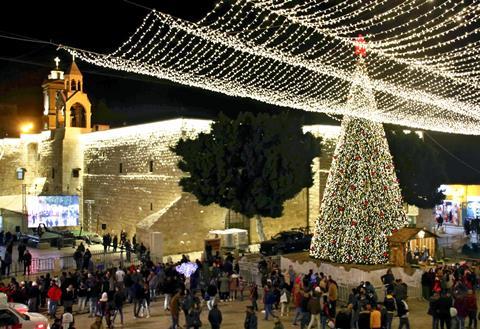The authorities in Bethlehem have decided not to display their annual nativity scene or Christmas tree in solidarity with Palestinians in Gaza. But is this a missed opportunity to build a bridge between the two sides?

Christmas celebrations in Bethlehem have been cancelled this year, including any festive display by Bethlehem municipality and the Palestinian church.
Such traditions have been preserved for decades, even taking place during the Second Intifada (2000-2005) when a Christmas tree stood prominently in Manger Square, despite the serious conflict all around. Similarly, the Covid-19 pandemic also did not stop Bethlehem from decorating the entire city.
However, today many Palestinian Christians are not in a festive mood. More Palestinians have been killed as a result of the war in Gaza than during the entire five years of the Second Intifada. The decision has been taken to cancel Christmas in the West Bank in order to show solidarity with suffering Palestinians in Gaza.
Some Christians have argued the conflict should be put to one side, and Christmas should be celebrated as normal in the region. But as a Palestinian who understands the Middle Eastern culture, I know that these attempts to somehow separate religion and politics are futile. The truth is that our festive celebrations have been politicised for years. The speeches that have been given in Manger Square in the past have not been full of gratitude for the birth of Jesus Christ and the spiritual implications. These speeches haven’t even been made by the spiritual leaders of the church, but by politicians. These leaders have used the platform Christmas in Bethlehem provides in order to focus the attention of the world on the Palestinian political situation, the ongoing Israeli occupation and the hardship of the Palestinians.
The general consensus among Palestinian Christians has been to agree with the decision to mute the Christmas celebrations. Christians in the region are deeply saddened by the amount of suffering that is happening right now. Christmas is a reminder of the birth of the most powerful, yet meek child ever born, but the current heart-breaking realities of 6,000 children dead in Gaza and around 40 Israeli children still being held hostage, has turned this feast into a contemplative reminder of the value of life and the grief of its loss.
In my opinion it is fitting to stand in solidarity with those who mourn, inspired by Paul’s letter to the Romans encouraging Christians to “Rejoice with those who rejoice; mourn with those who mourn” (Romans 12:15). The problem is, when the announcement was made that the annual Christmas display would be cancelled, our leaders said it was exclusively in honour of Palestinian “martyrs”, in Gaza and the West Bank. This disappointing statement distorts the Church’s role in the region as a peace builder and a bridge between different communities and ethnicities. It is a tragic, missed opportunity for the Church to show that it values all life - across every ethnicity and religion, without any discrimination or prejudice. A much more Christ-like statement would have highlighted solidarity with the devastating losses of lives on all sides.
This was a wasted opportunity to display the values of Christianity to the world. This was a chance for the Church in Bethlehem to reject the apathy commonly displayed regarding the plight of the Jewish people (during the Holocaust the European Church utterly failed to show solidarity with Jewish people). This was a missed opportunity for the Palestinian Church to show some humanity in recognising the suffering across the divides.
It saddens me as a Palestinian Christian to witness how politised churches in the Middle East have become.
We should remember the context - the vast majority of Palestinians are Muslims, who do not celebrate Christmas. And so I can’t help but wonder how much freedom churches have in the region to be as transparent to their beliefs and callings, and whether the decision to cancel all festive displays came from a place of complete agency or more of a place of fear. But ultimately, the most pressing question is this: What would happen if the Palestinian Church was able to acknowledge the losses on the Israeli side as well? Might that help bring us just a little bit closer to peace?
Lara is a Palestinian Christian who is currently based in the UK
































3 Readers' comments